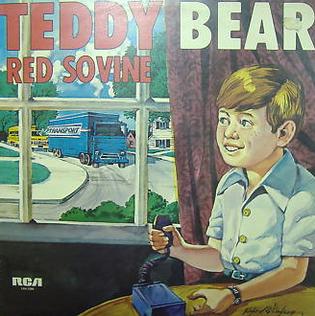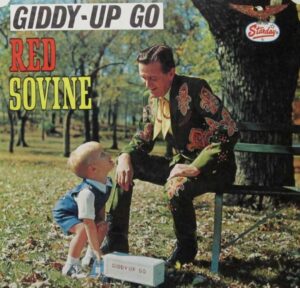When it comes to trucking songs of the 1960s and 1970s, listeners recognize few voices as easily as that of Woodrow Wilson “Red” Sovine, a West Virginia native born in 1917. His distinctive songs in which he recited rather than sang the lyrics set a precedent for many country music “storytellers” who followed. And during his heyday, Sovine left his mark on the trucking song sub-genre that rivals any other performer. Unfortunately, as time passes so do the expectations of radio listeners. Politically acceptable verbiage and society’s fears have changed since the ‘70s, and “Teddy Bear,” the song bringing Sovine his greatest fame, would not make a blip on country charts in the 21st century.
Red Sovine began his music career at an early age. His mother taught him to play guitar, and during his teenage years, he performed live on a hometown radio station. Sovine eventually formed a group, The Echo Valley Boys, and continued with his audience of a few listeners in West Virginia.
After high school, he worked in a hosiery manufacturing plant, a job he gave up for a move to Shreveport and a shot to play the Louisiana Hayride, the second-most popular country music radio show short of the Grand Ole Opry. Prompted by Hank Williams, Sr., Sovine planned a move to a station offering a better time slot in Williams’ hometown of Montgomery, Alabama. Fellow Louisiana Hayride performer Webb Pierce had other ideas. He convinced Sovine to lead his band, and during the ‘50s, the two recorded a duet, “Why Baby Why?” a song topping the country music charts. With a little success in his pocket, Sovine broke ties with Pierce and set out to find success as a solo artist.
It’s often said country singers need a niche — something separating them from other artists in Nashville. While Red Sovine didn’t invent trucking songs, in 1965 he recorded the first of many to come with “Giddy Up, Go,” introducing his voice in narrator style with backup instrumentals. In short order, this form of music became his niche. Sovine continued recording, adding the “almost based on a true story ’Phantom 309’” to his discography a couple of years later. Still, it would be 1975 before Sovine reached No. 1 on the charts with the sentimental song, “Teddy Bear.”
I’d like to say listeners either love or hate “Teddy Bear,” but as it did occupy the No. 1 slot on U.S. Country charts, most obviously loved it. It’s “sappy-sentimental” lyrics turned some off, but the song offered a fresh image of truck drivers to the general public. Many trucking songs had portrayed truck drivers as outlaws, pill-poppers, and womanizers, but “Teddy Bear” offered an alternate image – one of truckers as heroes with huge hearts, if only on a small scale. What makes “Teddy Bear” so interesting is that today, 45 years after its release, Sovine’s best known recording and one of the most recognized trucking songs on radio would unlikely even make it to the demo recording studio – at least not without some serious changes to the story’s plot and lyrics.
In “Teddy Bear,” Sovine introduces himself as an OTR driver spending much of his life on the road. While he doesn’t come out and say it, his voice suggests a lonely life, and he uses the CB radio as an alternative to true friendships. By chance, he contacts a “little boy” over the CB who is known by his handle, “Teddy Bear.” Now, Teddy Bear’s age is never said, but the phrase “little boy” is used multiple times in the song and based the album’s cover art suggests Teddy Bear to be quite young, maybe just nine years old. The simple question of age sets the stage for three fatal flaws that haunt the song’s legacy.
Teddy Bear tells the narrator (Sovine) that his father was a truck driver who, a month earlier, was killed in an accident. His mother is not home much as she tries to support what remains of her family. And as Teddy Bear laments, he isn’t much help with his “two crippled feet.” Now, the ‘70s were a different time and people used different words, but consider how often you hear the word “crippled” in describing a person today. Somewhere along the way, “crippled” became offensive and is now all but eradicated from regular conversation. Likewise, consider the last time you saw a 10-year-old using a wheelchair. Did the wheelchair have a sign, “Warning: Crippled Child Aboard”? Hardly. Instead the sign likely read something like “Speed Demon” or “Did you say “disabled”? Who’s disabled?” Over the past 30 or so years, the perception of disabilities has changed in society, and I challenge you to find a little boy lamenting his “two crippled feet.”
Based on what we learn in the early part of Teddy Bear’s story, the young boy is generally immobilized by an inability to walk. Yet, his mother, Mama Teddy Bear, leaves him alone all day while she works. Of course, in the situation described, it’s obvious Mama Teddy Bear is in a tight spot. In 1975, ordinary day care had yet to become the multi-billion-dollar industry it would a few years later, and short of institutionalization, parents of “crippled” kids had few options. Still, it’s hard to believe any state child services agency would look kindly on a child like Teddy Bear being left alone all day. In fact, looking back, it’s downright unbelievable, even for the ‘70s.
As far as different places and different times are concerned, the 1970s were far more innocent than 2020. When Red Sovine recorded “Teddy Bear,” photos of missing children had yet to appear on milk cartons. Aside from high-profile cases like Patty Hearst, missing children were not high on the list of public concerns; it was almost as if they didn’t exist. Of course, kids did go missing, and years later the issue would be considered just short of a national epidemic.
Today, we try to protect our kids against “stranger danger,” but with social media in play, we are caught in a never-ending fight to protect their identities and personal details. So, when Red Sovine asks, “Before you go 10-10, what’s your home ‘20,’ little CB friend?” and Teddy Bear responds with “Jackson Street, 229,” Generation X and young millennial parents’ jaws drop to the floor. The result as described in the song’s conclusion is three city blocks of trucks backed up in front of Teddy Bear’s house and drivers taking the little boy for rides. Mama Teddy Bear is nowhere to be found. In 1975, Teddy Bear returns safely from each ride, and the trucks are gone before Mama gets home. One must question if the 21st century story would have such a happy ending.
There you have it. Although I know many of you love “Teddy Bear” (and probably have a few coarse words for me), in today’s society, “Teddy Bear” would still be noticed – as a source of controversy.
The sentiment of Red Sovine’s “Teddy Bear” and the reasons for its chart-topping performance in 1975 are hard to argue. The song simply doesn’t transition well in the 21st century. A sequel of little note to the song was recorded years later, and we learn that Teddy Bear does have a daytime caretaker. Other than Teddy Bear’s death at the end of the song, there is little new the sequel offers. In fact, one must question if it was recorded for any other reason than to rectify at least one noticeable flaw in the original song.
Love it or hate it, “Teddy Bear” would need a makeover to get airplay today. Society changes, and sometimes it’s even for the better. If Red Sovine was alive, he’d probably recognize it as well.
Until next time, keep with the rhythm (and “may God ride with you, 10-4, and good-bye”).
Since retiring from a career as an outdoor recreation professional from the State of Arkansas, Kris Rutherford has worked as a freelance writer and, with his wife, owns and publishes a small Northeast Texas newspaper, The Roxton Progress. Kris has worked as a ghostwriter and editor and has authored seven books of his own. He became interested in the trucking industry as a child in the 1970s when his family traveled the interstates twice a year between their home in Maine and their native Texas. He has been a classic country music enthusiast since the age of nine when he developed a special interest in trucking songs.











A safer and simpler time is not a flaw. Now is a flaw. Trust is not a flaw but distrust is. I would relish a song that takes you back to the good old days like “Grandpa” However I did have to take my Red Divine CD out of the car because I can’t drive well while Crying. I also had to remove “911 silent night “by Mannheim Steam Rollers and a narrator. Makes me cry.
Red Solvine
There is no such thing as safe or simple times. People in the recent past only thought things were safe and simple because they were separated from and oblivious to the violence and misery their lifestyle was causing elsewhere in the world. We must face that now.
Spoken like a true Moran!! It’s a damn song, not a political debate. If you don’t agree with the politics of a song, just don’t listen to it. Your opinion is just that; your opinion, and carries no more or less value than any other individual with an opinion. Furthermore, I don’t see where “lifestyle’ has anything to do with this article (unless you are a “Trucker”.
Teddy Bear was a touching song, when men aspired to be Godly men, who were good husbands and fathers.
Yes people were molested back then, and disabled people didn’t have many resources. But the point of the song was don’t judge people by their appearance. Many truckers and bikers have a soft spot
in their hearts for kids. Society is sick today, although they have nice names for all the problems that men don’t step ip and fix anymore. I liked when men were tough on the outside and tender on the inside.